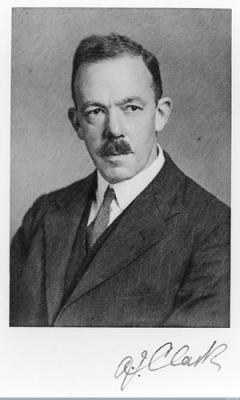Prof Alfred J Clark elected into BPS Hall of Fame
Dec 15: The members of the British Pharmacology Society have voted Prof Alfred Clark into the BPS Hall of Fame to posthumously recognise his distinction in science and valuable contribution to our Society.
Alfred J Clark's pioneering studies on the chemistry of drug action established him as the father of the modern subject of pharmacology. His classic textbook on the subject, “Applied Pharmacology”, ensured the continuation of the long tradition of discovery and innovation in the field of pharmacology at the University of Edinburgh.

This is perhaps fitting recognition not just for his scientific contribution, but also for his contribution as perhaps the most active founder member of the British Pharmacological Society. Unfortunately, he died suddenly in 1941 at the age of 56, 5 years before the Society’s journal came into being.
Professor Clark was the 7th person to occupy the Chair of Pharmacology (Materia Medica) at the University of Edinburgh from 1926-1942.
The work of Langley, Hill, Erlich and Dale laid the foundations for the birth of the modern discipline of pharmacology during the first decade of the 20th century.
Thereafter the subject stood still, that is until 1926 when A.J. Clark published his now classical papers on the actions of acetylcholine and atropine on the heart. Clark was the first to introduce the log concentration-effect curve, which has become an icon of pharmacology; and the current BPS logo. Clark made the bold step of relating the hyperbolic shape of the stimulus-response curve of drugs to the equilibrium binding equation. He concluded: ‘‘The hypothesis that the concentration-action curve of acetylcholine expresses an adsorption process of the type described by Langmuir appears to involve fewer improbable assumptions than any alternative hypothesis’’ – ie, neurotransmitters, hormones and drugs interact with receptors.
Clark provided the first quantitative study of the antagonism of acetylcholine by atropine and described the now familiar ‘parallel shift’ of the log concentration-response curve produced by a competitive antagonist. He and several of his contemporaries also sought to estimate ligand uptake by organs using methods that represented the forerunner of radio-ligand binding assays, which revolutionized investigations on the selectivity of drug-receptor interactions in the 1980s. Clark calculated, by his relatively imprecise method, that the amount of acetylcholine taken up by the frog heart in producing a 50% maximal effect was sufficient to cover only a small fraction (<1%) of the membrane surface area.
It was from this point forward that the receptor concept began to take hold.

